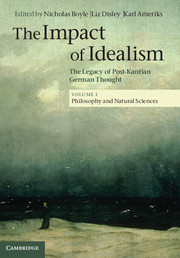120 results
Chapter 9 - On the Many Senses of “Self-Determination”
- from Part III - Freedom as Autonomous Willing: Kant’s Sensible Agent
-
-
- Book:
- Kant on Freedom and Spontaneity
- Published online:
- 07 September 2018
- Print publication:
- 27 September 2018, pp 171-194
-
- Chapter
- Export citation
Chapter 12 - Once Again: The End of All Things
- from Part IV - Conclusion
-
-
- Book:
- Kant on Persons and Agency
- Published online:
- 20 December 2017
- Print publication:
- 28 December 2017, pp 213-230
-
- Chapter
- Export citation
16 - The Legacy of Idealism in the Philosophy of Feuerbach, Marx, and Kierkegaard
-
-
- Book:
- The Cambridge Companion to German Idealism
- Published online:
- 30 August 2017
- Print publication:
- 11 August 2017, pp 358-385
-
- Chapter
- Export citation
Index
-
- Book:
- The Cambridge Companion to German Idealism
- Published online:
- 30 August 2017
- Print publication:
- 11 August 2017, pp 407-413
-
- Chapter
- Export citation
Introduction
-
-
- Book:
- The Cambridge Companion to German Idealism
- Published online:
- 30 August 2017
- Print publication:
- 11 August 2017, pp 1-20
-
- Chapter
- Export citation
Contents
-
- Book:
- The Cambridge Companion to German Idealism
- Published online:
- 30 August 2017
- Print publication:
- 11 August 2017, pp v-vi
-
- Chapter
- Export citation

The Cambridge Companion to German Idealism
-
- Published online:
- 30 August 2017
- Print publication:
- 11 August 2017
Copyright page
-
- Book:
- The Cambridge Companion to German Idealism
- Published online:
- 30 August 2017
- Print publication:
- 11 August 2017, pp iv-iv
-
- Chapter
- Export citation
Map of Jena
-
- Book:
- The Cambridge Companion to German Idealism
- Published online:
- 30 August 2017
- Print publication:
- 11 August 2017, pp xiii-xiv
-
- Chapter
- Export citation
Chronology of German Idealism
-
- Book:
- The Cambridge Companion to German Idealism
- Published online:
- 30 August 2017
- Print publication:
- 11 August 2017, pp xii-xii
-
- Chapter
- Export citation
Contributors
-
- Book:
- The Cambridge Companion to German Idealism
- Published online:
- 30 August 2017
- Print publication:
- 11 August 2017, pp vii-xi
-
- Chapter
- Export citation
Bibliography
-
- Book:
- The Cambridge Companion to German Idealism
- Published online:
- 30 August 2017
- Print publication:
- 11 August 2017, pp 386-406
-
- Chapter
- Export citation
Chapter 2 - On Universality, Necessity, and Law in General in Kant
- from Part I - The Lawfulness of Nature
-
-
- Book:
- Kant and the Laws of Nature
- Published online:
- 31 March 2017
- Print publication:
- 16 March 2017, pp 30-48
-
- Chapter
- Export citation
8 - The Historical Turn and Late Modernity
- from Part II - Hegel and Before
-
-
- Book:
- Hegel on Philosophy in History
- Published online:
- 27 January 2017
- Print publication:
- 26 January 2017, pp 139-156
-
- Chapter
- Export citation
Contributors
-
-
- Book:
- The Cambridge Dictionary of Philosophy
- Published online:
- 05 August 2015
- Print publication:
- 27 April 2015, pp ix-xxx
-
- Chapter
- Export citation
Contributors
-
-
- Book:
- Kant’s <I>Religion within the Boundaries of Mere Reason</I>
- Published online:
- 05 May 2014
- Print publication:
- 17 April 2014, pp ix-xi
-
- Chapter
- Export citation
Chapter 7 - Kant, miracles, and Religion, Parts One and Two
-
-
- Book:
- Kant’s <I>Religion within the Boundaries of Mere Reason</I>
- Published online:
- 05 May 2014
- Print publication:
- 17 April 2014, pp 137-155
-
- Chapter
- Export citation
List of Contributors
-
- Book:
- The Impact of Idealism
- Published online:
- 05 December 2013
- Print publication:
- 21 November 2013, pp viii-ix
-
- Chapter
- Export citation
List of Illustrations
-
- Book:
- The Impact of Idealism
- Published online:
- 05 December 2013
- Print publication:
- 21 November 2013, pp vii-vii
-
- Chapter
- Export citation

The Impact of Idealism
- The Legacy of Post-Kantian German Thought
-
- Published online:
- 05 December 2013
- Print publication:
- 21 November 2013



